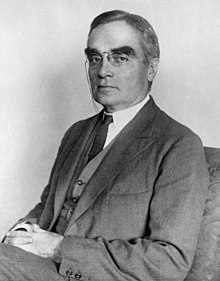Billings Learned Hand
| Learned Hand | |
|---|---|
 |
|
| Chief Judge on the United States Court of Appeals for the Second Circuit | |
|
In office September 1, 1948 – June 1, 1951 |
|
| Preceded by | Position established |
| Succeeded by | Thomas Walter Swan |
| Judge on the United States Court of Appeals for the Second Circuit | |
|
In office December 20, 1924 – June 1, 1951 |
|
| Appointed by | Calvin Coolidge |
| Preceded by | Julius Marshuetz Mayer |
| Succeeded by | Harold Medina |
| Judge on the United States District Court for the Southern District of New York | |
|
In office April 26, 1909 – December 20, 1924 |
|
| Appointed by | William Howard Taft |
| Preceded by | Seat established |
| Succeeded by | Thomas D. Thacher |
| Personal details | |
| Born |
Billings Learned Hand January 27, 1872 Albany, New York, U.S. |
| Died | August 18, 1961 (aged 89) New York City, New York, U.S. |
| Political party |
Democratic (Before 1900) Republican (1900–1912) Progressive (1912–1916) |
| Spouse(s) | Frances Amelia Fincke |
| Children | 3 |
| Alma mater |
The Albany Academy Harvard University (AB, LLB) |
Billings Learned Hand (/ˈlɜːrnᵻd/ LURN-id; January 27, 1872 – August 18, 1961) was a United States judge and judicial philosopher. He served on the United States District Court for the Southern District of New York and later the United States Court of Appeals for the Second Circuit. Hand has been quoted more often by legal scholars and by the Supreme Court of the United States than any other lower-court judge.
Born and raised in Albany, New York, Hand majored in philosophy at Harvard College and graduated with honors from Harvard Law School. After a short career as a lawyer in Albany and New York City, he was appointed at the age of 37 as a Federal District Judge in Manhattan in 1909. The profession suited his detached and open-minded temperament, and his decisions soon won him a reputation for craftsmanship and authority. Between 1909 and 1914, under the influence of Herbert Croly's social theories, Hand supported New Nationalism. He ran unsuccessfully as the Progressive Party's candidate for Chief Judge of the New York Court of Appeals in 1913, but withdrew from active politics shortly afterwards. In 1924, President Calvin Coolidge promoted Hand to the Court of Appeals for the Second Circuit, which he went on to lead as the Senior Circuit Judge (later retitled Chief Judge) from 1939 until his semi-retirement in 1951. Scholars have recognized the Second Circuit under Hand as one of the finest appeals courts in the country's history. Friends and admirers often lobbied for Hand's promotion to the Supreme Court, but circumstances and his political past conspired against his appointment.
...
Wikipedia
